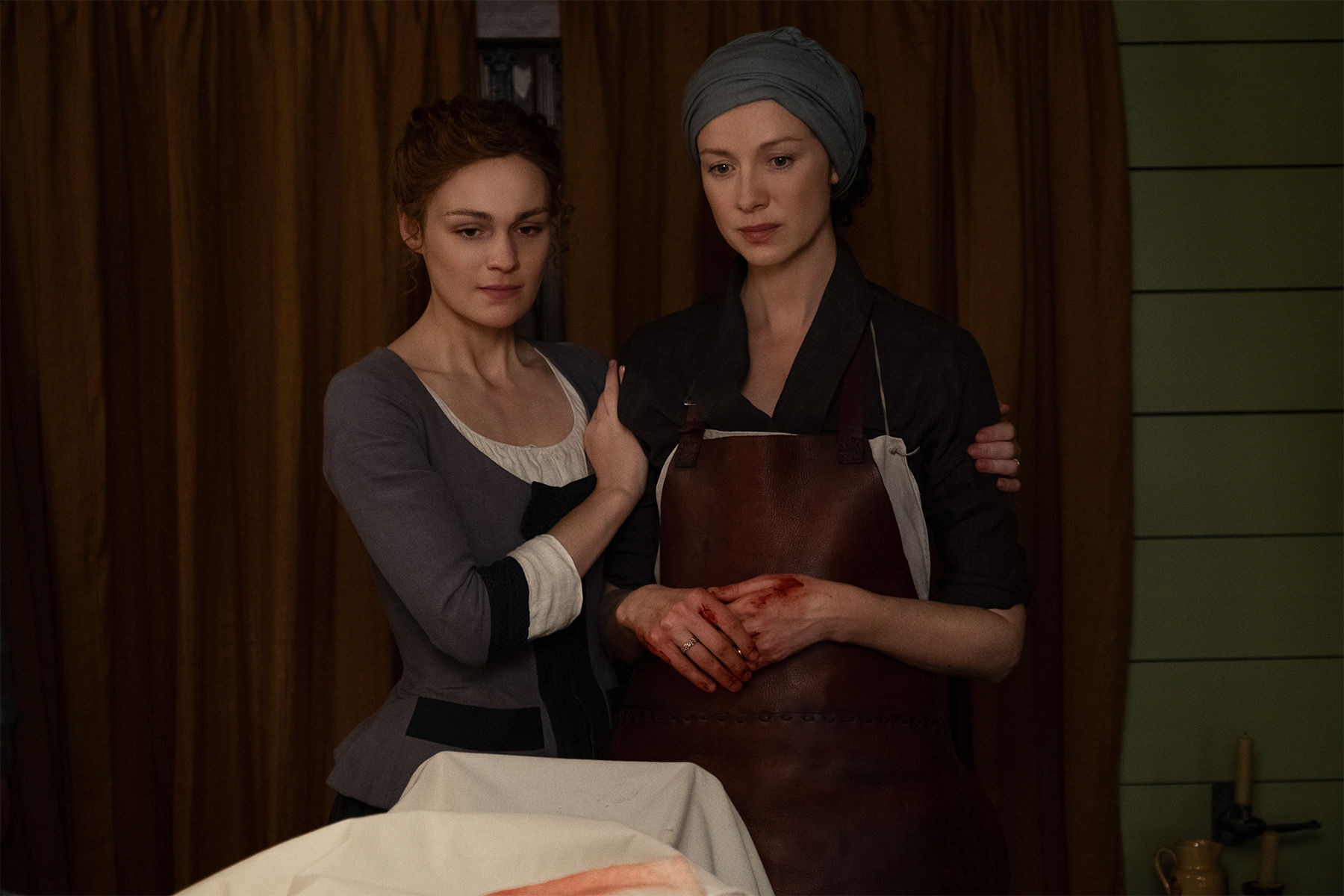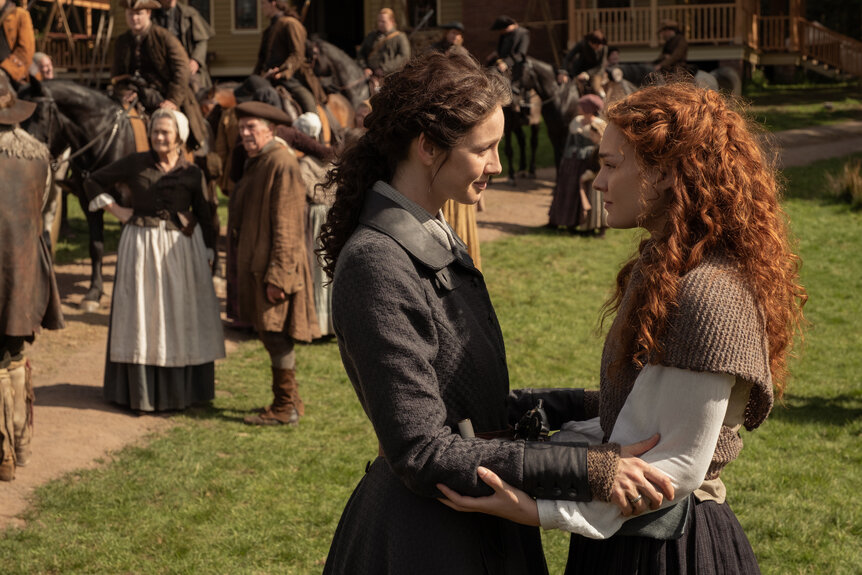Create a free profile to get unlimited access to exclusive videos, sweepstakes, and more!
Outlander addresses the 'playing God' time travel conundrum in an unusual way

The rules of time travel vary from story to story, but one common thread, whether it is Back to the Future or Timeless, is to change as little as possible. One interaction can have devastating consequences, and the potential ripple effect cannot be predicted. Marty McFly and his siblings were almost erased from existence after he inadvertently almost stopped his parents getting together at the Enchantment Under the Sea dance in 1955. Meanwhile, Lucy Preston's sister ceased to be after the team failed in their mission to let the Hindenburg disaster play out exactly as it had originally done in the Timeless pilot.
The impact one person's survival or death can have is hard to measure, regardless of fame or stature. Of course, if a president or the inventor of an important device is killed then the ramifications will be notable, but the consequences of altering the path of an average person's life could also be huge. Children will not be born, and the sprawling impact of that is hard to quantify on a precise scale. On Outlander, Claire Fraser (Caitriona Balfe) has tried to change major events such as the Battle of Culloden. And while she couldn't beat history on that occasion, her continued presence in the past is likely having a chain reaction on the present. As a physician, Claire has sworn an oath, but her present circumstances restrict her abilities to save lives, even though she has the knowledge to do so. In the case of Timeless, Lucy was tasked with using her expertise to save history, but Claire's skill set will have the opposite impact. Is her ethical duty to history or her patients?
Warning: Spoilers within for Season 5 of Outlander.
In Season 5, Claire has made a conscious choice to do everything she can with her 20th-century medical background, including attempting to create penicillin. The latter is defying the rules in a way that will have huge ramifications, shifting a vital discovery forward by 157 years. Scottish scientist Sir Alexander Fleming will not discover the life-saving antibiotic until 1928, and it won't be used to treat infections until 1942. Instead, Claire is hoping she can cultivate the right mold via stale bread and other food waste. In Episode 3, she notes she is "tempting fate," and while she is motivated by the urge to save lives, there is an undertone of arrogance suggesting she has a cavalier attitude toward the world she came from. Of course, her concern is with the present she is now in, but her seeming dismissal of the future she knows is somewhat alarming.
"Time, space, history be damned," is Claire's response to Brianna (Sophie Skelton) after her daughter confronts her about this particular plan to meddle with the scientific discovery timeline. Crafting leaflets with tips for preventative healthcare by an unseen Dr. Rawlings is one thing, but this poses a more significant ethical question. When Bri suggests her mom is playing God, Claire responds that this is not unique to this situation; they have all made choices that could shift history. Bri came through the stones to save her parents' life last season, instantly altering whatever version of the past had already happened. And while Claire argues her case well, one life being saved is unlikely to have the same ramifications as the invention of penicillin.
So what kicks off Claire's desire to beat Fleming to his great discovery? No, it isn't because she wants to see her face on the Clydesdale Bank £5 note. "It's bad enough I'm fighting the disease. But I'm also fighting the cure," she explains in the aftermath of a man dying. His appendix burst, and his wife's attempts to save him only accelerated his death. Claire knows that bloodletting and mercury pills are not the miracle cure citizens of this era believe them to be, but there is always a danger her knowledge will raise suspicions. Bri is concerned for her mother's safety if she continues to showcase her abilities. After all, she has already been accused of witchcraft.
In "Between Two Fires" the sight of a body cut open overwhelms Brianna — in part because of the guts, but also because an autopsy makes sense practically and intellectually in 1969, not in 18th-century America. Her point is proven when Marsali (Lauren Lyle) reacts with horror when Claire first reveals this project, leaping to witchcraft. Reason wins out when Claire explains the why of her plan — the dead can tell the secrets of what kills the living — emphasizing the teachable benefits of cutting open those who are no longer with us. Luckily, Marsali proves herself to be an excellent choice of apprentice (after she gets over the initial shock).
Claire has also put her apprentice in charge of the penicillin project in her absence. She isn't going to let her other duties get in the way of this new endeavor. In fact, events in "Free Will" underscore why her physician sensibilities prevent her from coming to the historical question as a historian would. In Timeless, Lucy makes peace with letting figures like Abraham Lincoln die (even though she could prevent it) because her job is predicated on letting those events play out. For Claire, it isn't because of arrogance per se, but as a doctor, she "can't walk away." Her first time through the stones, her medical expertise was based on her nursing experience during World War II. When she came back, she was not only a doctor but a qualified surgeon. She can't be asked to forgo all that training, even if it could have a far wider impact.
Ethically, she has taken the Hippocratic Oath. Part of the modern version — rewritten by American physician Louis Lasagna in 1964 — reads as follows: "I will respect the hard-won scientific gains of those physicians in whose steps I walk, and gladly share such knowledge as is mine with those who are to follow." Claire is technically walking ahead, having switched places with Alexander Fleming, but she also has the knowledge to share. It's an ethical quandary when factoring in the big picture, but having seen so much needless death already, she is applying the oath she took to save future lives.
Only three episodes into this season and the question of Bri, Roger (Richard Rankin), and baby Jemmy's future — more specifically, what year they should live in — has come up with high frequency. Not being able to protect her family against curable diseases in the 20th century has no doubt fueled Claire's choices; she is not simply driven by altruism or the oath she has taken. Disease is the Chekhov's gun of Season 5, threatening to strike at any given moment.
If they do venture back through the stones, will the world be impacted by what has occurred down at Fraser's Ridge? Despite Claire's interactions with "Black Jack" Randall (Tobias Menzies), Frank's existence was not impacted. The cosmic balance and rules of space and time have not come crashing down: No one has been erased from family photos and existence. So far, Outlander is not Timeless or Back to the Future, but what ramifications Claire's actions will have on the future remains to be seen.




























